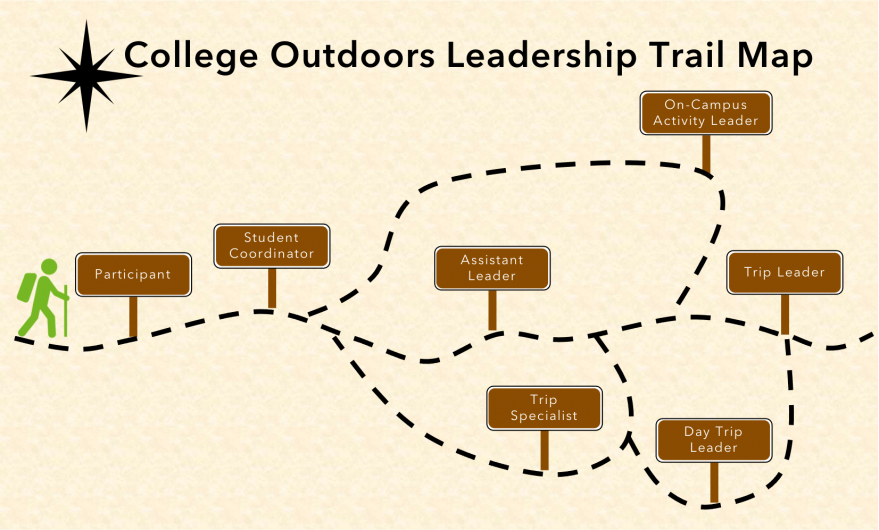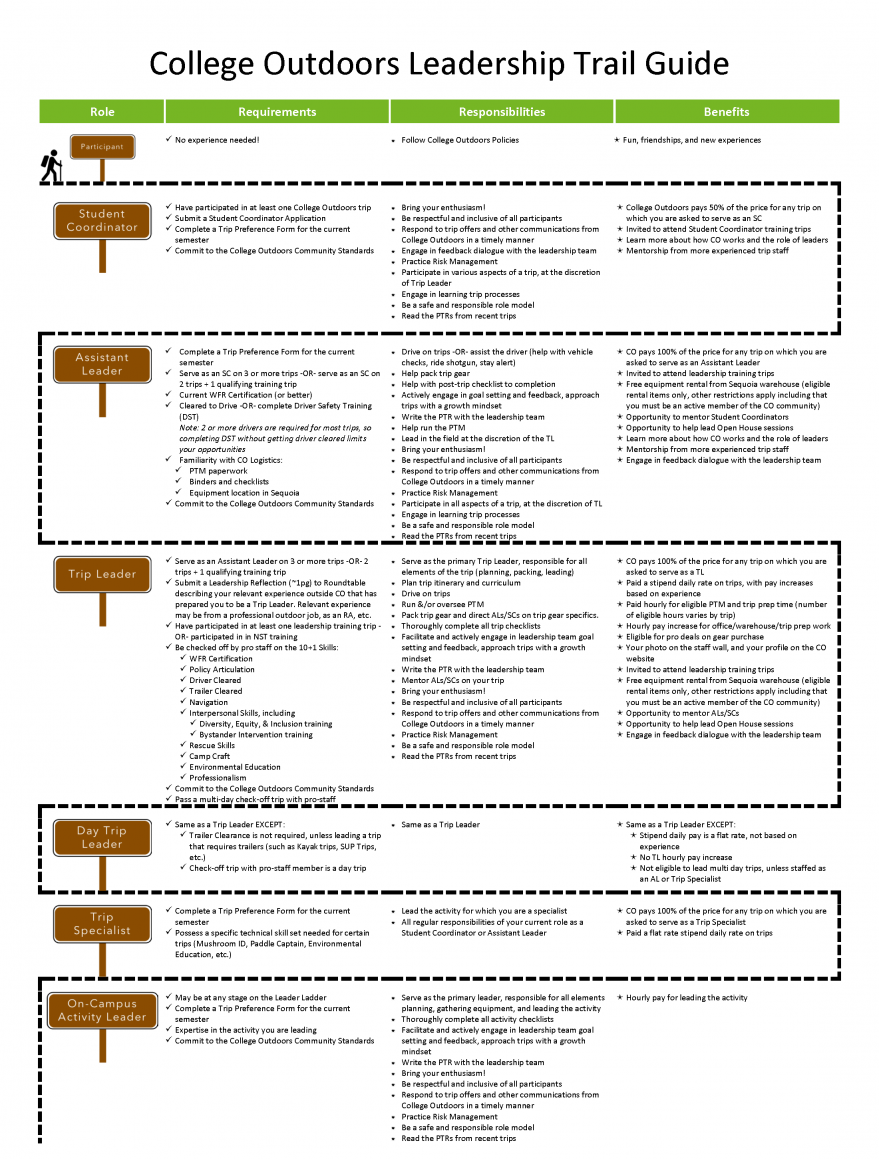Leadership Roles
Learn the 10+1 Skills of Outdoor Leadership, and Trek the Leadership Trail
Leadership Trail
Student Leadership with College Outdoors is a journey, and there are many paths to take! The Leadership Trail Map below represents the different roles available to students, and the pathways you can take through the College Outdoors leadership development program. Every student begins as a Participant, and from there may become a Student Coordinator (SC), Assistant Leader (AL), Trip Leader (TL), Day Trip Leader (DTL), Trip Specialist (TL), or On-Campus Activity Leader (OC).

Leadership Trail Guide
Each leadership role has specific requirements, responsibilities, and benefits. You don’t need any previous outdoor experience to trek the Leadership Trial, since College Outdoors provides training along the way.
10 + 1: Outdoor Skills
Paid Trip Leaders and Day Trip Leaders are expected to have mastery of these skills as outlined in the Leadership Trail Guide above, but you will learn many of these skills in every leadership role!
These skills can be learned through our program, so no experience is necessary! We offer a variety of trips, clinics, and apprenticeship opportunities that help you develop these skills. The one exception to this is the driving requirement, since you must have a driver’s license. However, we will train you on all the other driving related skills, such as changing a tire, using snow chains, and driving with a trailer.
1. Interpersonal Skills are crucial for communicating knowledge, risk management, providing effective group management, and facilitating a fun and inclusive experience.
- Set goals for each trip and participate in post-trip debrief sessions
- Mentor newer trip staff (on trips and by leading Open House sessions)
- Engage with participants in authentic ways
- Give and receive constructive feedback
- Use inclusive language and define jargon and acronyms
- Know a variety of games, initiatives, and group facilitation techniques
Participate in training sessions on:
- Inclusion & Equity
- Conflict Resolution
- Risk Management
2. Wilderness First Responder (WFR) or other professional medical training is invaluable when you are more than an hour from a hospital. The ability to perform a solid patient assessment, and provide care for complaints ranging from anaphylactic shock to blisters, is paramount to being a guide.
- WFR, EMT, WEMT, or another comparable 80hr+ medical training + CPR
- Certifications must be current to lead trips
3. Policy Articulation is vital. Rules are in place to ensure safe trips. The ability to persuade participants to voluntarily obey College Outdoors’ policies rather than imposing them is an all but required tactic.
- Swimming, personal floatation devices, alcohol and drugs, closed-toe shoes, cliffs, lightning, search
& rescue
- Use of “Near Miss” & “Incident” reports
4. Driving is the most dangerous part of any College Outdoors trip. As such, we take all possible steps to reduce road related risks.
- Excellent safe driving abilities and practices with program vehicles in all environments including:
- City, highway, unpaved roads, and winter conditions
- Ability to change a flat tire
- Deploy flares & hazard triangles
- Jumpstart a dead battery
- Know when and how to mount snow chains
- Complete pre-departure vehicle checklist
- Maintain current fleet defense certificate
- Complete a check-off run with a full-time staff member of College Outdoors
5. Trailer Training: complex trips demand trailers. As a result, leaders expecting to lead these trips must be able deftly maneuver in reverse in order to even leave Sequoia.
Be able to complete the following:
- 1 complete and continuous turn in reverse around the Corbett House Circle
- Do a 90 degree backing turn into the vehicle yard
- Complete a highway driving check-off
- Demonstrate safe trailer driving and backing on a trip
6. Navigation is essential. Leaders should be comfortable navigating using various (digital and analog) methods. There is a great series of navigation videos here, and a useful quiz to check your skills here.
Be able to effectively operate and use a trail GPS or an app such as Gaia:
- Mark waypoints
- Enter target coordinates
- Create & follow breadcrumbs
Be able to effectively use and operate map & compass:
- Take & follow a bearing
- Shoot bearing to determine location
- Read topographical features accurately
- Read location coordinates off a map in both UTMs and Latatude/Longitude
7. Rescue Skills change depending on the particular trip you are leading. One must be prepared to handle trip-specific risk management, as well as emergency response.
Have the necessary skills for the trip you are leading:
- Avalanche awareness
- Swiftwater rescue
- Sea kayak rescues
- Winter rescue skills
8. Camp Craft
Knot Knowledge and the ability to secure tarps and cargo on vehicles are useful, impressive, and critical for safety.
- Trucker hitch
- Bowline
- Use of Cam-Straps
- Make a Daisy Chain
- Coil a rope
Stove Use for cooking meals is important for both safety and the pleasure of enjoying a delicious meal
- Cookpartner (front country propane stove)
- MSR Dragonfly (backcountry stove for cooking)
- MSR Reactor (backcountry stove for boiling water)
Sanitation Practices keep your group healthy and make for a professionally run experience.
- Keep a clean kitchen & cooler, and prevent contamination
- Wash dishes
- How to poop in the woods (using cat holes, groovers, or wag bags as necessary)
9. Environmental Education is an important component of any outdoor outing. It ties participants to the land that we visit. Leaders should take time to learn the basic geology, flora, and fauna of the area before (well, sometimes during…) each trip.
- Leave No Trace
- Orient and connect participants to the natural world using geology, area biology, etc.
10. Professionalism, prompt response to emails, and meticulous use of checklists is beloved at College Outdoors. It takes countless hands to get any College Outdoors trip out the door: adhere to the systems in place for efficiency, be considerate (e.g. on time) for others, and use the checklists for transparency.
Always use/do the following:
- PTM Checklist
- Group Gear Checklist
- Pre-departure Checklist
- Golden Hour Checklist
- Daily Duties List
- Blue tape for clear labeling
- Respond to emails/voicemails/text messages promptly
- Write thorough Post-Trip Reports
- Explain and model “expedition behavior”
+1 skill that you uniquely bring to the experience, or just something you want to learn!
9 Insider Tips for successful navigation of the Leadership Trail
-
There is a lot involved in becoming a Trip Leader and it can be a big investment in time, so if that is your goal it is useful to start working towards it sooner than later.
-
You are going to want some kind of professional development while you are in College, and CO is a great option for that! Know that that in order to get the most out of College Outdoors, it will take a significant amount of your time. The more you put in, the more you’ll get out.
-
As with any job, we expect that when people make a commitment they follow through or clearly communicate any change of plans as early as possible. If we don’t perceive that we can count on you, you aren’t likely to get placed on trips.
-
- Get cleared to drive right away and demonstrate good driving habits. Learn how to back a trailer.
- Take advantage of trainings and Open House. If you already know the skill being taught, offer to help out. This not only helps your solidify skills, but makes you an integral part of the CO community.
- Be a good role-model on campus. Stay out of trouble. Don’t get written up (we look at conduct records). Follow the College Outdoors Community Standards.
- Get a relevant leadership experience outside of CO right away, and check with pro-staff to make sure it qualifies for TL/DTL eligibility beforehand. We are looking for experiences that require planning, ownership, responsibility, and interpersonal skills. Some great examples: Summer jobs leading multi-day backpacking trips for teens, whitewater raft guiding, being an RA, being a Program Director at a summer camp, field research with a logistical responsibility component, etc. Again, ASK if your idea for a position will count.
- Respond to professional staff emails, texts, and voicemails right away, even if it is just to say that you need to think about it but will get back to them by such and such date.
- Be open to, and seek out, feedback. Set goals for yourself on trips, and participate in post-trip debrief sessions. Provide encouraging, actionable feedback to other leaders seeking it from you.
- Help out with New Student Trips. If you lead an NST you will get tons of field time, on-the-job training, pre-trip training, trip and CO logistical practice. It accelerates all processes of your leadership development and gets you involved in the greater CO community (alum, etc.). Helping with Spring Break trips also gets you tons of valuable experience.
- Ask questions and vocalize where you want to be with College Outdoors. Advocate for yourself. Reach out to members of the Roundtable, Professional staff, or the leaders on your trips.
Of course, if you ever have questions, don’t hesitate to stop by our office in Templeton 244 or by the Sequoia Warehouse on South Campus. You may also feel free to call (503) 768-7116 or email us at outdoors@lclark.edu.
College Outdoors is located in room 239 of Fowler Student Center on the Undergraduate Campus.
MSC: 188
email outdoors@lclark.edu
voice 503-768-7116
fax 503-768-7876
Director Joe Yuska
College Outdoors
Lewis & Clark
615 S. Palatine Hill Road MSC 188
Portland OR 97219
